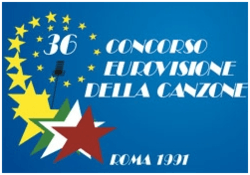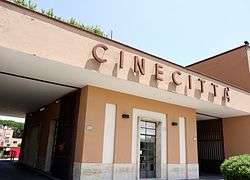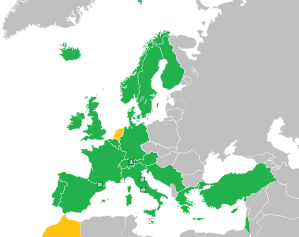Eurovision Song Contest 1991
| Eurovision Song Contest 1991 | |
|---|---|
 | |
| Dates | |
| Final | 4 May 1991 |
| Host | |
| Venue |
Studio 15 di Cinecittà Rome, Italy |
| Presenter(s) |
Gigliola Cinquetti Toto Cutugno |
| Conductor | Bruno Canfora |
| Directed by | Riccardo Donna |
| Executive supervisor | Frank Naef |
| Host broadcaster | Radiotelevisione Italiana (RAI) |
| Opening act | Sara Carlson singing amongst the ruins of ancient Rome; Toto Cutugno singing "Insieme: 1992" and Gigliola Cinquetti singing "Non ho l'età" |
| Interval act | Arturo Brachetti |
| Participants | |
| Number of entries | 22 |
| Debuting countries | None |
| Returning countries |
|
| Withdrawing countries |
|
|
Participation map
| |
| Vote | |
| Voting system | Each country awarded 12, 10, 8-1 point(s) to their 10 favourite songs |
| Nul points |
|
| Winning song |
"Fångad av en stormvind" |
The Eurovision Song Contest 1991 was the 36th Eurovision Song Contest and was held on 4 May 1991 in Rome. Due to the Gulf War and mounting tensions in Yugoslavia, RAI decided to move the contest from Sanremo to Rome, which was perceived to be more secure.
This was the last event in which the Socialist Federal Republic of Yugoslavia participated. The 1992 contest saw the participation of the Federal Republic of Yugoslavia (comprising only Serbia and Montenegro). It was also the first time that Germany was represented in their reunited form since the East Germany joined West Germany by the German reunification.
Carola was the winner of this Contest with the song "Fångad av en stormvind". This was the third victory for Sweden, after 1974 and 1984. There was a tie between Carola and France's Amina, as both had received 146 points. This necessitated a 'count-back', a tie-breaking measure introduced after the infamous four-way tie in 1969. Both Sweden and France had received four sets of 12 points, but Sweden had received five sets of 10 points to France's two, so Carola was declared the winner.
Location

The contest was originally scheduled to be held at Teatro Ariston in Sanremo, where the Sanremo Music Festival takes place annually. It was for the organisers to pay tribute to the Italian festival that inspired the creation of the Eurovision Song Contest. But following the invasion of Kuwait by Iraq and the outbreak of the Gulf War, the host broadcaster RAI decided in January 1991, to better ensure the security of foreign delegations, it would move the contest to Rome. This caused serious organisational problems and delays.
Rome is the capital of Italy and a special comune (named Comune di Roma Capitale). Rome also serves as the capital of the Lazio region. Studio 15 of Cinecittà, a large film studio in Rome, was later confirmed as the new venue. With an area of 400,000 square metres, it is the largest film studio in Europe, and is considered the hub of Italian cinema. The studios were constructed during the Fascist era as part of a scheme to revive the Italian film industry.
Contest overview
The presenters were Gigliola Cinquetti and Toto Cutugno, who represented Italy when they won Eurovision in 1964 and 1990 respectively. Cutugno opened the contest singing Insieme: 1992, and Cinquetti performed Non ho l'età. Cutugno had some difficulty with the pronunciation of the song titles and names of the artists and conductors. Despite this, in Italy almost seven million people watched the show. In addition to tallying the vote numbers in English and French, Cinquetti and Cutugno gave each of the jury allotments in Italian as well.
Nearly all of the commentary during the voting was given in Italian, which is not an official language of the European Broadcasting Union. (English and French are, and in the Eurovision Song Contest it is mandatory to provide commentary in at least one of those languages)
Sara Carlson gave the opening ceremony performance, titled Celebration, a mixture of modern dance in ancient settings of Ancient Rome. The performance featured Carlson singing, and a mixture of street dance and classical dance choreographed to popular sounding music of the time. At the time, Carlson had appeared numerous times on Italian TV, and this was seen as one of her largest audiences.
The Netherlands did not participate in this contest as it conflicted with the Remembrance of the Dead national holiday, and so Malta was allowed to participate in the Contest for the first time in 16 years, unable to before due to restrictions on the number of countries allowed to participate.
Conductors
Each performance had a conductor who maestro the orchestra.
.svg.png)
















.svg.png)




Returning artists
| Artist | Country | Previous year(s) |
|---|---|---|
| Thomas Forstner | 1989 | |
| Stefán Hilmarsson (part of Stefán & Eyfi) | 1988 (part of Beathoven) | |
| Eiríkur Hauksson (part of Just 4 Fun) | 1986 (for Iceland, part of ICY) | |
| Hanne Krogh (part of Just 4 Fun) | 1971, 1985 (part of Bobbysocks!, winner) | |
| Carola | 1983 |
Results
Voting structure
Each country had a jury who awarded 12, 10, 8, 7, 6, 5, 4, 3, 2, 1 point(s) for their top ten songs.
During the final vote (Italy) none of the top three contenders - Sweden, Israel and France - had received any points up until the last 12-point vote. This vote went to France and for the first time in twenty-two years, there was a tie for first place, with France overcoming a large deficit to catch up with Sweden. However, since the four-way tie of 1969, the rules had been altered to ensure a single outright winner. The first step in the procedure was to check the number of 12-point votes awarded to each country. Sweden and France were still tied. But when counting the number of 10-point votes, Sweden had more and was finally declared the winner.
If the tie occurred under modern tie-breaking rules (post-2008 contest), France would have won because it had been voted for by more countries than Sweden.
Tiebreak results
| Place | Country | Artist | Points | 12 points | 10 points | Points from each country |
|---|---|---|---|---|---|---|
| 1 | Carola | 146 | 4 | 5 | 17 of 21 | |
| 2 | Amina | 146 | 4 | 2 | 18 of 21 |
Score sheet
| Results | ||||||||||||||||||||||||
|---|---|---|---|---|---|---|---|---|---|---|---|---|---|---|---|---|---|---|---|---|---|---|---|---|
| Yugoslavia | 1 | 1 | ||||||||||||||||||||||
| Iceland | 26 | 4 | 10 | 5 | 7 | |||||||||||||||||||
| Malta | 106 | 1 | 2 | 6 | 4 | 10 | 12 | 2 | 7 | 12 | 7 | 6 | 10 | 4 | 6 | 7 | 10 | |||||||
| Greece | 36 | 4 | 5 | 2 | 1 | 1 | 4 | 1 | 1 | 5 | 10 | 2 | ||||||||||||
| Switzerland | 118 | 5 | 5 | 7 | 8 | 12 | 8 | 4 | 2 | 2 | 6 | 5 | 3 | 8 | 5 | 6 | 12 | 8 | 8 | 4 | ||||
| Austria | 0 | |||||||||||||||||||||||
| Luxembourg | 29 | 4 | 5 | 1 | 3 | 2 | 4 | 3 | 2 | 3 | 2 | |||||||||||||
| Sweden | 146 | 6 | 12 | 10 | 10 | 7 | 6 | 3 | 10 | 12 | 8 | 10 | 8 | 12 | 10 | 4 | 12 | 6 | ||||||
| France | 146 | 10 | 7 | 3 | 8 | 7 | 12 | 5 | 7 | 5 | 12 | 12 | 10 | 8 | 7 | 8 | 6 | 7 | 12 | |||||
| Turkey | 44 | 7 | 7 | 8 | 7 | 2 | 5 | 8 | ||||||||||||||||
| Ireland | 47 | 3 | 4 | 3 | 1 | 8 | 4 | 7 | 1 | 2 | 2 | 5 | 4 | 3 | ||||||||||
| Portugal | 62 | 8 | 4 | 1 | 2 | 7 | 10 | 5 | 1 | 2 | 7 | 10 | 4 | 1 | ||||||||||
| Denmark | 8 | 3 | 5 | |||||||||||||||||||||
| Norway | 14 | 6 | 1 | 1 | 2 | 4 | ||||||||||||||||||
| Israel | 139 | 12 | 10 | 8 | 5 | 8 | 5 | 6 | 3 | 12 | 8 | 4 | 10 | 7 | 6 | 8 | 12 | 10 | 5 | |||||
| Finland | 6 | 1 | 1 | 4 | ||||||||||||||||||||
| Germany | 10 | 6 | 1 | 3 | ||||||||||||||||||||
| Belgium | 23 | 3 | 2 | 5 | 3 | 3 | 2 | 5 | ||||||||||||||||
| Spain | 119 | 8 | 2 | 6 | 10 | 12 | 7 | 6 | 4 | 6 | 8 | 6 | 8 | 4 | 2 | 4 | 7 | 6 | 1 | 12 | ||||
| United Kingdom | 47 | 10 | 3 | 5 | 6 | 3 | 1 | 1 | 3 | 5 | 3 | 1 | 6 | |||||||||||
| Cyprus | 60 | 2 | 3 | 12 | 12 | 4 | 12 | 5 | 3 | 6 | 1 | |||||||||||||
| Italy | 89 | 7 | 2 | 6 | 2 | 8 | 10 | 10 | 12 | 10 | 3 | 12 | 7 | |||||||||||
12 points
Below is a summary of all 12 point in the final:
| N. | Contestant | Voting nation |
|---|---|---|
| 4 | France | Austria, Israel, Italy, Norway |
| Sweden | Denmark, Germany, Iceland, United Kingdom | |
| 3 | Cyprus | France, Greece, Malta |
| Israel | Spain, Turkey, Yugoslavia | |
| 2 | Italy | Finland, Portugal |
| Malta | Ireland, Sweden | |
| Spain | Cyprus, Switzerland | |
| Switzerland | Belgium, Luxembourg |
Postcards
The singers were asked to sing a known Italian song which would then be used as a short clip for the postcard. The songs were in order:
Commentators
Spokespersons
.svg.png)
















.svg.png)




National jury members
From this year, half of the members had to be music professionals.




.svg.png)

References
- ↑ "Eurovision Song Contest 1991". The Diggiloo Thrush. Retrieved 5 March 2012.
- ↑ "Morgunblaðið, 04.05.1991". Timarit.is. Retrieved 2012-08-10.
- ↑ "Η Δάφνη Μπόκοτα και η EUROVISION (1987-2004)". Retromaniax.gr. Retrieved 2012-08-10.
- ↑ Oberösterreichische Nachrichten, 3 May 1997
- 1 2 3 Christian Masson. "1991 - Rome". Songcontest.free.fr. Retrieved 2012-08-10.
- 1 2 "Infosajten.com". Infosajten.com. Archived from the original on July 18, 2012. Retrieved 2012-08-10.
- 1 2 "Comentadores Do ESC - escportugalforum.pt.vu | o forum eurovisivo português". 21595.activeboard.com. Archived from the original on April 21, 2012. Retrieved 2012-08-10.
- 1 2 "Forside". esconnet.dk. Archived from the original on 2012-03-24. Retrieved 2012-08-10.
- ↑ "Hvem kommenterte før Jostein Pedersen? - Debattforum". Nrk.no. Archived from the original on November 2, 2012. Retrieved 2012-08-10.
- ↑ "Selostajat ja taustalaulajat läpi vuosien? • Viisukuppila". Viisukuppila.fi. Retrieved 2012-08-10.
- ↑ "Eurovision Song Contest 1991". Ecgermany.de. Retrieved 2012-08-10.
- ↑ "Hasselt 2005: Jarige André Vermeulen verzorgt commentaar met Ilse Van Hoecke". Eurosong.be. 2005-10-25. Archived from the original on 26 March 2012. Retrieved 2018-05-07.
- ↑ "FORO FESTIVAL DE EUROVISIÓN • Ver Tema - Uribarri comentarista Eurovision 2010". Eurosongcontest.phpbb3.es. Archived from the original on 2012-03-17. Retrieved 2012-08-10.
- 1 2 Savvidis, Christos (OGAE Cyprus)
- ↑ "Peppino Di Capri Comme è ddoce o mare Eurofestival 1991". YouTube. Retrieved 2012-08-10.
- ↑ Times of Malta, 5 May 1991
- ↑ "Εκφωνητές της ΕΡΤ για τις ψήφους της Ελλάδας στην EUROVISION - Page 3". Retromaniax.gr. Retrieved 2012-08-10.
- ↑ Baumann, Peter Ramón (OGAE Switzerland)
- ↑ "Concours Eurovision de la Chanson • Consulter le sujet - Porte-paroles des jurys des pays francophones". Eurovision.vosforums.com. Retrieved 2012-08-10.
- ↑ Dyrseth, Seppo (OGAE Norway)
- ↑ "פורום אירוויזיון". Sf.tapuz.co.il. 1999-09-13. Archived from the original on October 8, 2011. Retrieved 2012-08-10.
- ↑ "Selostajat ja taustalaulajat läpi vuosien? • Viisukuppila". Viisukuppila.fi. Retrieved 2012-08-10.
- ↑ "ESC 1991 Belgian Votes by An Ploegaerts and a jumping Carola". YouTube. 2011-04-13. Retrieved 2012-08-10.
- ↑ "María Ángeles Balañac". Imdb.es. 2009-05-01. Retrieved 2012-08-10.
- ↑ Dagbladet, 5 May 1991
- ↑ "000webhost.com - free web hosting provider". Eurofestival.host22.com. 2012-08-10. Archived from the original on 15 August 2011. Retrieved 2018-05-07.
External links
| Wikimedia Commons has media related to Eurovision Song Contest 1991. |

